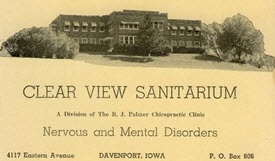One of the great missed opportunities in the history of chiropractic health care is it's failure to pursue
the success it had established in the realm of mental health care.
 From the 1920's to the 1950's a number of chiropractic institutions operated as care facilities for the mentally insane.
From the 1920's to the 1950's a number of chiropractic institutions operated as care facilities for the mentally insane. Clear View Sanitarium and Forest Park Sanitarium are probably the most well-known. The records of these facilities illustrate the fact that chiropractic (properly applied, of course) is extremely effective in the treatment of psychological disorders--things like schizophrenia, dementia and sundry violent and delusional behaviors.
Unfortunately, a combination of poor leadership in the chiropractic profession, along with the birth of suffocating governmental regulation, resulted in virtually all of this being flushed down the memory-hole.
In the Current Year, it's virtually impossible for chiropractic, on any substantial scale, to compete with mainstream medicine's monopoly of the care of those suffering with mental illness. And by "care", I of course mean the medication of millions Americans into a state of mental operation which quickly and effectively subdues any aberrant behavior that

might be considered socially unacceptable.
Yes, it's truly amazing what passes for "progress" in the world of modern health care. Even the farce of Freudian psychoanalysis would be preferable to rolling the dice with the heavily advertised anti-psychotic medications which are aggressively dispensed without regard to any reasonable measures of safety and effectiveness. But, you know, it would just be too uncomfortable to talk about anti-psychotic medication and high-profile mass shootings in the same sentence.
However, one thing you do see a lot of in a chiropractic practice is the resolution of the less extreme manifestations of mental illness: things like depression and anxiety.
As a rule these are not individuals seeking care expressly for depression or anxiety. These are people who have other problems - physical problems
, usually - who also happen to have depression or anxiety. The real twist is that the physical problems they are seeking care for are often actually a result of their depression. And when chiropractic effectively addresses the cause of their depression, their physical symptoms resolve.
The patient walks away thinking that chiropractic fixed their physical ailment (and
maybe they realize it may have also have helped with their depression, but don't count on it), when in reality chiropractic addressed a fundamental problem affecting that patient's
mental health, thereby resolving their depression. I'm not sure if that meets the technical requirements for irony, but it must be close.
The unfortunate result is that a lot of people who are helped by chiropractic with mental and emotional disorders never really make the connection. So the link remains relatively unrecognized in the general public.
Which is a good reminder for chiropractors. It might seem clear to the chiropractor that the resolution of an anxiety disorder was clearly the result of a patient's chiropractic care, but as Dr. Barge puts it, "...many a patient with right leg pain that recovers under chiropractic care knows one thing and one thing only...you're good, chiropractic's good, for right leg pain...they're not too sure about the left."
The roadblock in the way of chiropractic's ability to (re-)demonstrate its effectiveness in the more extreme types of mental illness, I think, is the fact that a lot of these types of disorders are very scary. And when fear is a part of any equation, it usually means that the situation is prone to manipulation.
Mainstream medicine has basically gotten itself into an uncontested position when it comes to the treatment of mental illness because 1) they excel at, and have the pharmaceutically-generated funds to manipulate the mindset of the public, and 2) the pharmaceutical treatment of mental disorders is extremely effective.
Unfortunately the treatment these people receive doesn't make them any healthier. It doesn't make them "well again." What it does is quickly subdue the jarring behavior or disruptiveness of the individual.
That is its effectiveness.
I've never had to take care of a family member or friend with something like schizophrenia. I can't imagine the physical and emotional toll it must take on you. But I would imagine that for a lot of people it wouldn't take long to accept just about anything that would give some seeming relief to the situation. And pharmaceutical treatment has the ability to provide that relief.
Chiropractic care
has the ability to get a lot of these people well. But it's not well known, and I would argue that it would be more difficult to manage.
On the upside, you would have a lot of these people actually getting well and becoming functioning members of society with the ability to enjoy their lives again.
There's another side to the mental illness problem that's often swept under the rug, or is at least just as ineffectively managed as those types of mental disorders that are considered "health problems." This is the connection between mental illness and criminal behavior.
Identifying a bipolar disorder as a health problem is one thing. But the situation gets a lot more difficult when faced with criminal behavior. I don't think it would be accurate to say that all criminal behavior is related to something that can be labeled as a "health problem", but it's clear that there's a connection between the two.
This recently published study from the Canadian Medical Association concluded that men and women who had suffered traumatic brain injury (TBI) were 2.5 times more likely to be incarcerated than those who hadn't. That's not new information either. There are
a lot of studies that show this same link.
Clearly there is some connection between criminality and health. The problem is how to address it. A lot of the ideas put forth tend to be reactionary. And while I don't have a problem with that type of approach per se, I would argue that a better approach would be to address the types of injuries that are potentially associated with criminal behavior
before the criminal behavior actually takes place.
Concussions, mild and severe traumatic brain injury, and even seemingly innocuous head injuries can and do create displacement of spinal vertebrae--particularly in the upper cervical complex that consists of the head and upper two bones in the neck.
These displacements are often small, and a visit to the emergency room isn't going to identify them. But they can have significant effects on both physical and mental health because of the disruption they can cause to neurological integrity and fluid dynamics in the brain-box.
A competent chiropractor can identify and correct the displacement of these vertebrae in order to correct and prevent the physical problems associated with head and neck injuries. More importantly, when corrected promptly, chiropractic can prevent these types of injuries from leading to mental and emotional issues that are commonly associated with head injuries.
By all accounts, mental illness is a growing problem in the United States. Unfortunately the system that monopolizes the treatment of mental illness is ill-equipped to deal with it in a way that actually restores mental health. This leads to a population that is increasingly over-medicated.
Maybe the most unfortunate effect of this trend is that it's become so accepted that it has trickled down to the youngest members of our society. We now have countless numbers of children who take medication to address mental and emotional problems. Many of these children will live their entire lives taking medication that changes the way they process the world, themselves and the people they interact with. Some of them will be okay, and some of them will do things that they never would have contemplated had they not been living for years in an altered cognitive state.
Chiropractic offers an alternative to this destructive trend that can address the underlying dysfunction for many individuals suffering mental and emotional disorders.


 From the 1920's to the 1950's a number of chiropractic institutions operated as care facilities for the mentally insane. Clear View Sanitarium and Forest Park Sanitarium are probably the most well-known. The records of these facilities illustrate the fact that chiropractic (properly applied, of course) is extremely effective in the treatment of psychological disorders--things like schizophrenia, dementia and sundry violent and delusional behaviors.
Unfortunately, a combination of poor leadership in the chiropractic profession, along with the birth of suffocating governmental regulation, resulted in virtually all of this being flushed down the memory-hole.
In the Current Year, it's virtually impossible for chiropractic, on any substantial scale, to compete with mainstream medicine's monopoly of the care of those suffering with mental illness. And by "care", I of course mean the medication of millions Americans into a state of mental operation which quickly and effectively subdues any aberrant behavior that
From the 1920's to the 1950's a number of chiropractic institutions operated as care facilities for the mentally insane. Clear View Sanitarium and Forest Park Sanitarium are probably the most well-known. The records of these facilities illustrate the fact that chiropractic (properly applied, of course) is extremely effective in the treatment of psychological disorders--things like schizophrenia, dementia and sundry violent and delusional behaviors.
Unfortunately, a combination of poor leadership in the chiropractic profession, along with the birth of suffocating governmental regulation, resulted in virtually all of this being flushed down the memory-hole.
In the Current Year, it's virtually impossible for chiropractic, on any substantial scale, to compete with mainstream medicine's monopoly of the care of those suffering with mental illness. And by "care", I of course mean the medication of millions Americans into a state of mental operation which quickly and effectively subdues any aberrant behavior that  might be considered socially unacceptable.
Yes, it's truly amazing what passes for "progress" in the world of modern health care. Even the farce of Freudian psychoanalysis would be preferable to rolling the dice with the heavily advertised anti-psychotic medications which are aggressively dispensed without regard to any reasonable measures of safety and effectiveness. But, you know, it would just be too uncomfortable to talk about anti-psychotic medication and high-profile mass shootings in the same sentence.
might be considered socially unacceptable.
Yes, it's truly amazing what passes for "progress" in the world of modern health care. Even the farce of Freudian psychoanalysis would be preferable to rolling the dice with the heavily advertised anti-psychotic medications which are aggressively dispensed without regard to any reasonable measures of safety and effectiveness. But, you know, it would just be too uncomfortable to talk about anti-psychotic medication and high-profile mass shootings in the same sentence.
 From the 1920's to the 1950's a number of chiropractic institutions operated as care facilities for the mentally insane. Clear View Sanitarium and Forest Park Sanitarium are probably the most well-known. The records of these facilities illustrate the fact that chiropractic (properly applied, of course) is extremely effective in the treatment of psychological disorders--things like schizophrenia, dementia and sundry violent and delusional behaviors.
Unfortunately, a combination of poor leadership in the chiropractic profession, along with the birth of suffocating governmental regulation, resulted in virtually all of this being flushed down the memory-hole.
In the Current Year, it's virtually impossible for chiropractic, on any substantial scale, to compete with mainstream medicine's monopoly of the care of those suffering with mental illness. And by "care", I of course mean the medication of millions Americans into a state of mental operation which quickly and effectively subdues any aberrant behavior that
From the 1920's to the 1950's a number of chiropractic institutions operated as care facilities for the mentally insane. Clear View Sanitarium and Forest Park Sanitarium are probably the most well-known. The records of these facilities illustrate the fact that chiropractic (properly applied, of course) is extremely effective in the treatment of psychological disorders--things like schizophrenia, dementia and sundry violent and delusional behaviors.
Unfortunately, a combination of poor leadership in the chiropractic profession, along with the birth of suffocating governmental regulation, resulted in virtually all of this being flushed down the memory-hole.
In the Current Year, it's virtually impossible for chiropractic, on any substantial scale, to compete with mainstream medicine's monopoly of the care of those suffering with mental illness. And by "care", I of course mean the medication of millions Americans into a state of mental operation which quickly and effectively subdues any aberrant behavior that  might be considered socially unacceptable.
Yes, it's truly amazing what passes for "progress" in the world of modern health care. Even the farce of Freudian psychoanalysis would be preferable to rolling the dice with the heavily advertised anti-psychotic medications which are aggressively dispensed without regard to any reasonable measures of safety and effectiveness. But, you know, it would just be too uncomfortable to talk about anti-psychotic medication and high-profile mass shootings in the same sentence.
might be considered socially unacceptable.
Yes, it's truly amazing what passes for "progress" in the world of modern health care. Even the farce of Freudian psychoanalysis would be preferable to rolling the dice with the heavily advertised anti-psychotic medications which are aggressively dispensed without regard to any reasonable measures of safety and effectiveness. But, you know, it would just be too uncomfortable to talk about anti-psychotic medication and high-profile mass shootings in the same sentence.

